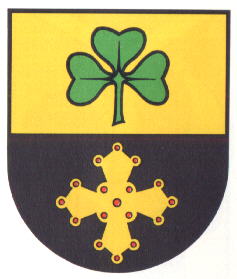Woltwiesche: Difference between revisions
Jump to navigation
Jump to search
Knorrepoes (talk | contribs) m (Text replacement - "/Arms of " to "/Arms (crest) of ") |
Knorrepoes (talk | contribs) m (Text replacement - "{{media}}" to " {{de1}} {{media1}}") |
||
| Line 25: | Line 25: | ||
The clover leaf in the upper part is a canting symbol, the name can be derived from Wald-wiese, of forest-meadow. The leaf refers to the meadow part of the name. The base shows a bronze cross dating from the 9th century, which was excavated near the village. It symbolises the long inhabitation of the area. | The clover leaf in the upper part is a canting symbol, the name can be derived from Wald-wiese, of forest-meadow. The leaf refers to the meadow part of the name. The base shows a bronze cross dating from the 9th century, which was excavated near the village. It symbolises the long inhabitation of the area. | ||
{{ | |||
{{de1}} | |||
{{media1}} | |||
[[Civic Heraldry Literature - Germany|'''Literature''']]: Rabbow, 1977 | [[Civic Heraldry Literature - Germany|'''Literature''']]: Rabbow, 1977 | ||
Revision as of 10:59, 26 December 2022
This page is part of the German heraldry portal |
Heraldry of the World |
|
German heraldry:
|
Selected collector's items from Germany:
|
WOLTWIESCHE
State : Niedersachsen
District (Kreis) : Peine
Incorporated into : 1972 Lengede
| German | |
| English | No blazon/translation known. Please click here to send your (heraldic !) blazon or translation |
Origin/meaning
The arms were officially granted on December 20, 1952.
The clover leaf in the upper part is a canting symbol, the name can be derived from Wald-wiese, of forest-meadow. The leaf refers to the meadow part of the name. The base shows a bronze cross dating from the 9th century, which was excavated near the village. It symbolises the long inhabitation of the area.
Literature: Rabbow, 1977


